- Home
- P. T. Deutermann
Cold Frame [retail] Page 21
Cold Frame [retail] Read online
Page 21
She laughed. “I’m a Washingtonian,” she said. “Both my parents were schoolteachers here in Fairfax County. I grew up in Herndon, which is one of the not-so-important suburbs. Went to George Mason, got a degree in business management, and then went to work for the Department of Transportation as a cubicle slave.”
Hiram smiled. “Must have been pretty boring,” he said.
“I didn’t end up living at home like some of my classmates did,” she said. “The issues were interesting, but I learned pretty quick that the bureaucracy’s main focus was on nurturing itself, not solving the issues affecting transportation.”
“That’s universally true, from what I’ve observed,” he said. “And then?”
“I was dating a guy who was a newbie agent at the Bureau, and he told me that they were desperately trying to recruit and integrate women agents into the major Bureau career fields. I decided to take a shot. Long story short, I ended up in the New York field office, met a young investment banker at a conference, and we got married. That ended, unfortunately, on nine-eleven.”
Hiram’s eyebrows went up. “And now you sit on a committee that…”
“Yes, exactly.”
Thomas appeared and refreshed Ellen’s wineglass. Hiram raised his empty glass, but Thomas ignored him and put the bottle back down on the table.
“Oh, my,” Ellen said, after Thomas left. “Nanny Thomas?”
“He knows, just like I know,” Hiram said.
She reached across the table and poured him a small splash. “Live a little,” she said.
“That’s just the problem,” Hiram said with a tired smile.
“Anyway, I’ve made my way. A career with the Bureau is about competence and conformity, in about equal measure. Hew to the straight and narrow, do your job, do it well, and they’ll unfailingly promote you. Screw something up, then things become a lot less certain.”
“And you being on the DMX?” he asked. “How’d that happen?”
“My boss got across the breakers with an ADIC—that’s an assistant director in charge, one rank level below the director. I don’t know what it was about, but one day he was gone and they were looking at me to take over one of his duties, which happened to be the DMX.”
“Was that a promotion?”
It was her turn to smile. “More like an assignment where the potential for screwing up was significant. DMX was—and still is—controversial. Savvier and more senior career agents probably declined the ‘opportunity,’ and there I was.”
“What do you do when the committee actually meets? In general, I mean—I know it’s all superclassified.”
“For good reason, Mister Walker. The information we use to make a nomination is derived from sources and methods that need rigorous protection. But to answer your question, we brief and we talk. And talk. Some agencies are into posturing, others are trying to protect themselves, the spooks like to be spooky—it’s a government committee, Mister Walker. But when we approve a nominee, we’re writing his death warrant.”
“And Carl Mandeville—what can you tell me about him?”
“He is the special assistant to the President and senior director for counterterrorism on the National Security staff. He works in the EEOB. That’s the old executive office building. Nowadays it houses the ceremonial offices of the Vice President and the offices of the National Security Council staff.”
“How important is he?” Hiram asked, sipping the last of his wine with visible regret.
“He’s a legend in his own mind,” Ellen said. “On the other hand, because no one knows exactly what his powers are, people are afraid of him, and he encourages that reaction. He’s arrogant, physically imposing, overbearing, and typically about half a mile ahead of anyone trying to go up against him.”
“A true mandarin, then,” Hiram said.
“Precisely,” she replied. “And, I’m pretty sure, a killer, or at least someone who has organized two murders. He’s the ‘who.’ Now: your turn. Please.”
Hiram nodded. “In 2011, a man called Kyle Strang approached me.” He went on to tell her what Strang had talked about.
“All of that being aimed at having a backup program in case the opponents of DMX shut off the means to execute the Kill List?”
“That’s what he said.”
She worked on her salad and had some more wine. “The things you handed over—would they account for the way in which these two men died?”
“Can’t tell,” Hiram said, hedging just a bit. “I don’t know how they died.”
“Well, let me fill you in on the one I was present for. That was McGavin. We were in a restaurant, we had a sip of wine, I went to the powder room, and when I came back, he was dead on the floor.”
“And the flowers?”
“Right, yes. I bought a bouquet of flowers from a vendor who came into the bistro.”
“Recognize them?” he asked. “The flowers?”
She thought about that for a minute. “No,” she said. “Very pretty, but no, I couldn’t tell you what they were, but then again, I don’t know anything about flowers, except—very pretty. The only technical term I’ve heard related to his case was ‘aconitine.’”
“Ah,” he said, nodding. “And Logan? I read in the papers that he got out of a taxi and just walked directly into oncoming traffic.”
“That’s all I know. I have a contact in the MPD who actually witnessed it. He said the man looked like a zombie.”
“What in the world is a zombie?”
She giggled. “The Zombie Revolution? Dead guys walking around and scaring people. Rigid bodies, lurching walk, scarifying faces—oh, shit, I—”
He was laughing now. “Walked right into that one, didn’t you,” he said.
Ellen realized she was blushing.
“Back to business,” he said. “Aconitine is a by-product of the monkshood plant. Extremely poisonous, and known to be so for centuries. The other case, Logan, is more complex. You’re describing the effects of what possibly might be a saxitoxin, commonly produced by algae, which are, of course, plants, usually aquatic plants. The best-known vehicle for human attacks are the cyanobacteria, some of which have been implicated in amyotrophic lateral sclerosis/parkinsonism–dementia complex.”
“That’s a mouthful,” she said.
“So to speak,” he replied. “Sometimes people eat shellfish, which tend to act as the ocean’s filtration system, and then have a reaction which mimics what you’ve been describing. It can range from a temporary discomfort to outright death. That’s why they clear the beach when an algal bloom appears.”
“Okay, here’s the tough question—did you give Strang anything like that? A bucket of pond scum or something?”
“No,” he said. “But I did give him one of my mutations of kelp.”
“Kelp?” she said. “As in those big-ass seaweed formations off San Diego?”
“Yup,” he said. “Kelp is an alga.”
“Holy shit.”
“Indeed, but it also means that Mister Strang or his boss has some connection with a certain army laboratory at Fort Detrick, Maryland, known as USAMRIID. It’s where the army used to develop biological weapons.”
“Good God!” she exclaimed. “I thought we were long out of that horrible business.”
“We are,” he said. “Now they work on ways to defend our troops against bioweapons that the other guys might use, such as our good friends in North Korea, Syria; enchanting places like that.”
She sat back in her chair. “I had no idea, and, I guess, I should have.”
“The world of toxins is all around us, Special Agent. Consider all those Hollywood lovelies who want fuller lips or a wrinkle-free forehead. What do they use?”
“Botox?”
“Yes, Botox. Otherwise known as botulinum toxin. Think botulism, often synonymous with death by paralysis. You see the problem here?”
“I’m starting to,” she said. “Would a toxicologist be able to sniff out one of these saxitoxins?”
<
br /> “I would,” he said. “But not most forensic criminology labs, no. The Bureau’s lab, yes, if properly cued. That said, it’s not what I do here, Special Agent. These lethal compounds the plants produce are defensive mechanisms. I’m interested in how they develop them and how they mutate them to fit changing circumstances—an increase in animal predation, the onset of drought, humans and their sprays, and so on. Sometimes humans are helping—think Roundup Ready corn seed, for instance. But then there are my beloved weeds, who manage it all on their own.”
“So if Mandeville gave him some substance like that, it might not even be detectable?”
“Correct,” he said. “Why do you say ‘gave him’?”
“Mandeville had dinner with Logan an hour or so before he did the zombie-walk into traffic.”
“Hmmm,” Hiram said. “Then here’s what I would suggest, Special Agent: focus on Mister Strang and the nature of his relationship with Mister Mandeville, and possibly the USAMRIID. And, secondly, test Mister Logan’s cellular remains for chlorophyll.”
“Chlorophyll? Seriously?”
“Yes. It’s basically all an alga does—turn sunlight into ‘stuff,’ using chlorophyll, like just about all plants. It does not belong in human cells, but a saxitoxin can put it there. In the meantime, I need to do some research of my own.”
“Would these substances be something you could keep, say, at home in your refrigerator?”
“No,” he said. “What I gave them was the individual toxin and the instructions on how to maintain it. That would take a biolab of some size and complexity.”
“Like USAMRIID?”
“Yes, that would be perfect. And, of course, your Mister Mandeville would probably have access to the scientists at Fort Detrick. I’m not saying they’re making bioweapons out there, Special Agent. It’s just that the process of developing a defense against chemical and biological weapons is to, first, reproduce or at least model the weapon. See?”
She nodded as Thomas appeared on the porch, which she realized was her cue to leave. She thanked him for the tour, lunch, and the frightening education.
He smiled that rueful smile. “We’ll probably be in touch, Special Agent,” he said, not getting up. “And please understand something: if someone at the rank and position of a Carl Mandeville has gained access to things like an aconitine aerosol, he can do a lot more damage than one man at a time, okay? Watch yourself.”
* * *
After his afternoon nap, Hiram went back to the library and reread the Washington Post article about the assistant secretary of the treasury’s bizarre accident. He was still tired after his day with the pretty special agent. Yesterday, he’d spent the entire day trying to figure out why a very special crossbred specimen had simply “up and died,” as his greenhouse helpers quaintly phrased it. He was wondering if another one of his weeds had killed it. They did that, from time to time, as if to remind him that there was a lot he didn’t know. It often gave him the sense that they were watching him about as much as he was watching them.
The article reported that the police were still investigating, of course, and that there was a possibility that alcohol may have been a factor. Revealingly, the driver of the Mercedes had not been charged and nor had the cabdriver. The latter had testified that his passenger had asked him to stop the cab, then opened the door, got out of the cab, and then walked directly into traffic. Then he’d added two interesting details—that the victim was walking like “some kind of robot” and that he appeared to be grinning dramatically as he got out of the cab. Confirmation of what the pretty FBI agent had told him.
The article also mentioned that Logan was the second senior Washington bureaucrat to die in the past week under strange circumstances, the other victim being one Francis X. McGavin, who had collapsed in a restaurant from what was rumored to be poisoning, according to the District’s medical examiner. The problem was that he had not eaten anything. He’d had a single sip of white wine while waiting for his lunch partner, but that had come from a bottle that had served two other people. The medical examiner’s office so far had not identified the suspected poison, nor was it even confirming that poison had been involved.
Hiram put the paper down on the side table and rubbed the small bones in his aching face. No lack of eager-leakers at the Metro PD or the medical examiner’s office, was there, he thought. That wasn’t what was worrying him. In 2011 he’d consented to share a few of the Phaedo Botanical Society’s more exotic botanical extracts with the Department of Homeland Security, supposedly in support of the DMX counterterrorism project. He’d talked to the other members before going ahead and everyone had been onboard. He’d given the spooks access to three plants, two from his own breeding program and one from Ozawa’s research, and that one, a variant of algae, produced symptoms bearing a remarkable similarity to those of the Treasury man, nuchal rigidity and a prominent rictus.
Logan had also walked into a busy stream of traffic, which might indicate tunnel vision, yet another symptom involving a saxitoxin. He didn’t have enough details about the McGavin case, so there were no conclusions to be drawn there. Yet. On the other hand, two of the plants he’d given the counterterrorism people could drop a human like a stone from just a passing contact with some of their volatiles. He shuddered to think about what this Mandeville fellow was contemplating. He realized he needed to talk to his colleagues in the society. He asked Thomas to set up a call that would catch most of them in daylight hours, or at least, early evening. Thomas named the time.
“It’s a good thing Ozawa still has insomnia,” Hiram remarked. “Thank you, Thomas.”
At the appointed time he went to the communications room, located just behind a discreet door in the library. He sat down in front of a Polycom total room immersion display, consisting of an eighteen-foot wraparound media wall, with three eighty-four-inch thin-bezel HD color displays. After the initial round of greetings and the usual inquiries about health and home, Hiram got down to business.
“Gentlemen, we may have a problem, and it’s one in which I may have had a hand. Do you remember the request from the U.S. government four years ago for some of our botanical toxins?”
Nods all around. “Has something gone astray?” Tennyson asked.
“It’s possible,” Hiram said. “I’m waiting for some medical examiner’s reports to see if there’s any possible match. I’ve heard of one incident that seems to have involved aconitine in a vapor state. The other one I haven’t seen, but based on the victim’s appearance, it may have been related to a cardiac glycoside from an oleander derivative, or a saxitoxin.”
“Veec-tims?” Giancomo de Farnese asked. “’Ees accident?”
“I’m afraid not, Giancomo,” Hiram said. “I think one of the Borgias is back.”
“Santa Maria,” Giancomo said.
Ozawa finally spoke up. “You give compounds to government, or plants?”
“Compounds, Hideki,” Hiram said. “To my knowledge the U.S. does not have any programs to develop toxins. They stopped their biological warfare program years ago. They do defensive work, but no developmental work.”
“Who died, then?” Tennyson asked.
Hiram told them. Ozawa hissed and de Farnese rolled his eyes.
“Do they know about us?” Tennyson asked.
“As of at least four years ago they did,” Hiram said. “They knew about the Phaedo Society before coming to ask for help, but I think that was because I’d been helping our intelligence and federal law enforcement authorities with some perplexing poisoning cases. What I gave them was supposed to be used in covert operations against the terrorist world.”
“So now someone’s using them in Washington?” Tennyson asked.
“Yes, I think that’s the case,” Hiram said. “Two senior government officials have died under very strange circumstances. It was probably a mistake to ever let some of our materials loose in the government.”
“Yes,” Ozawa said. “Mistake.”
&nbs
p; Hiram was a bit stung. “Does the Japanese government know about you and your work, Hideki-san?”
Ozawa sat back and blinked. Then he nodded forcefully, once. “Hai.”
“Giancomo?”
“What governo?” De Farnese asked. “Italia has no governo. Only clowns.”
Smiles. Tennyson spoke up. “Her Majesty’s government has used my services in much the same way yours has, Hiram,” he said. “And even some of your own rather marvelous creations. What’s going to happen now, do you suppose?”
Hiram hesitated. He didn’t want to scare his brethren. “There are people investigating what has happened. The killer may find out about that. He may even attempt to neutralize the source of his killing agents. He may even come here.”
Ozawa’s face broke into an evil grin. “He comes, you make video, yes?”
“Hideki, you’re a bloodthirsty bastard, aren’t you?” Tennyson said.
Ozawa put on what he thought was a face of total innocence. “In interest of science,” he said. “Only science.”
“Hideki-san has a point, Hiram,” Tennyson said. “You’ve gone much further along the mutation road than we have. I, myself, would be terribly interested in what happens if someone attempts to breach Whitestone.”
“Very well, gentlemen,” Hiram said. “I will report when it’s over, assuming I’m still able to report.”
“Have no fear, Hiram,” Tennyson said. “Did that snake pool experiment succeed?”
“It’s possible,” Hiram said. The connection was supposedly secure, but still … one had to be careful.
“Must make video,” Ozawa said. “For science.”
Hiram snorted and signed off the net.
SEVENTEEN
Carl Mandeville was in the office bright and early Saturday morning. Many of the staff were in as well: a posting to the National Security Council staff meant that Sundays were yours, at least some of the time. Otherwise, you came in, too often with the word “Divorce!” ringing in your ears.
Mandeville picked up his secure phone and dialed a number. When the ringing stopped and the tone sounded, he said one word: “Beacon.” Then he hung up and sent for coffee. Thirty minutes later his phone rang. The caller ID on the secure phone said, simply: Beacon.

 The Nugget
The Nugget The Hooligans
The Hooligans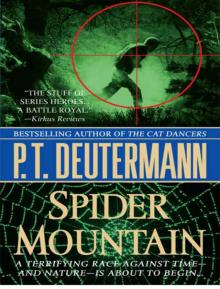 SPIDER MOUNTAIN
SPIDER MOUNTAIN![Cold Frame [retail] Read online](http://i1.bookreadfree.com/i/03/19/cold_frame_retail_preview.jpg) Cold Frame [retail]
Cold Frame [retail] Sweepers
Sweepers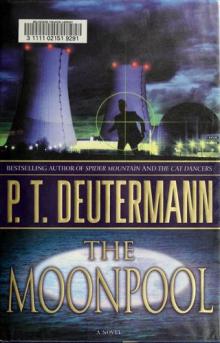 Cam - 03 - The Moonpool
Cam - 03 - The Moonpool Trial by Fire
Trial by Fire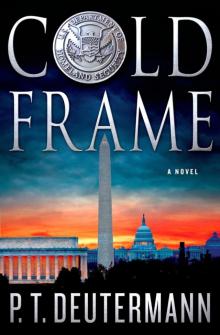 Cold Frame
Cold Frame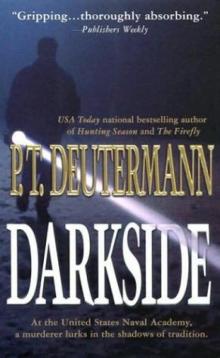 Darkside
Darkside Cam - 04 - Nightwalkers
Cam - 04 - Nightwalkers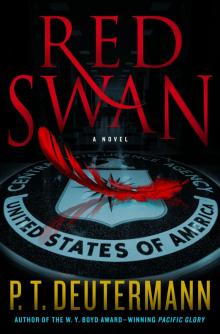 Red Swan
Red Swan The Commodore
The Commodore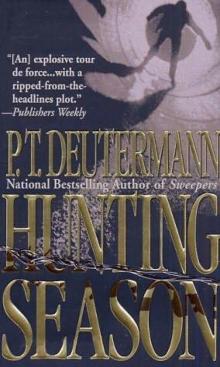 Hunting Season
Hunting Season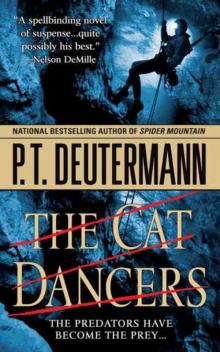 The Cat Dancers
The Cat Dancers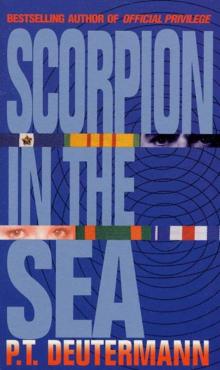 Scorpion in the Sea
Scorpion in the Sea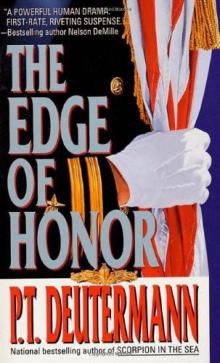 The Edge of Honor
The Edge of Honor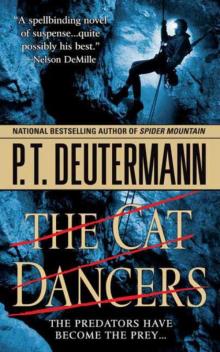 The Cat Dancers cr-1
The Cat Dancers cr-1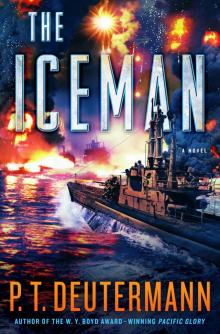 The Iceman
The Iceman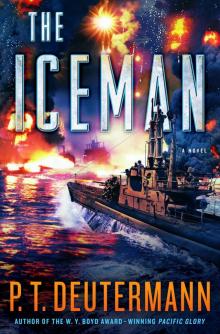 The Iceman_A Novel
The Iceman_A Novel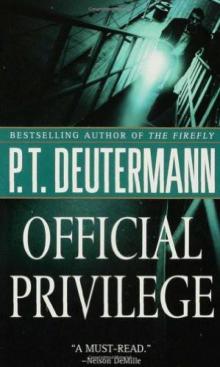 Official Privilege
Official Privilege Sentinels of Fire
Sentinels of Fire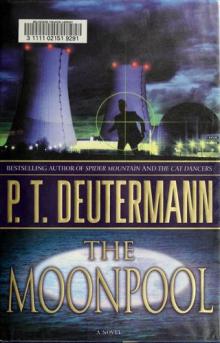 The Moonpool cr-3
The Moonpool cr-3 Nightwalkers cr-4
Nightwalkers cr-4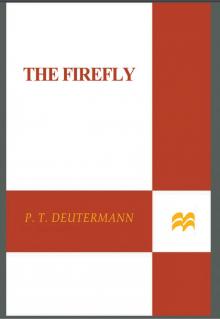 The Firefly
The Firefly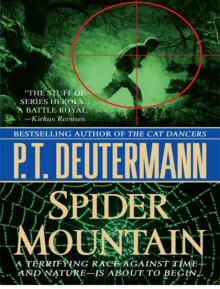 Spider mountain cr-2
Spider mountain cr-2 Pacific Glory
Pacific Glory The Last Man
The Last Man